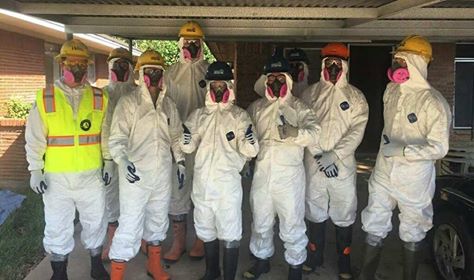Staying mentally healthy during disaster deployment
This week, we will send 12 WCC staff and AmeriCorps members to both Puerto Rico and U.S. Virgin Islands to help with the response to Hurricane Maria. Six more AmeriCorps members and staff are heading to Florida to assist communities affected by Hurricane Irma, and a new wave of 30 AmeriCorps members and staff will head for a second 30-day deployment to Texas.
AmeriCorps Disaster Response Teams capacity expands
It's amazing how fast 24 hours can go by. When you’re serving on an AmeriCorps Disaster Response Team assignment, so much happens in 24 hours it feels like an entire week. It’s hard to believe that our WCC disaster response team members arrived in Austin just three weeks ago.We have been serving 13-hour days, seven days a week, to maintain and support the overwhelming amount of donations and volunteers. If you were to ask anyone on the WCC response team how long they’ve been deployed to Texas, they might reply, “between 45 to 60 years.” That’s how long three weeks can feel during an emergency response.
A little more than a week ago, 38 Texas Conservation Corps (TxCC) and 52 Minnesota and Iowa Conservation Corps (CCMI) members arrived in Austin and we have been providing disaster response training and hands-on experience for the projects our new colleagues will support.
 |
| WCC AmeriCorps members Kelly Lewis (L) and Kayla Seaforth (R) lead the AmeriCorps Disaster Response Team planning section. |
Training new teams through
peer-to-peer dialogue
As part of the training, we engaged in an exercise that meant a lot to me when I received it as part of my WCC service. We divided the group into two sections: Those who had previous disaster response experience and those who did not.The seasoned responders wrote down the top five things they wish they had known before embarking on a response assignment. We asked those serving on their first disaster assignment to write their top 10 questions about what it's like to serve on a disaster response team. After much deliberation and conversation, representatives from each group reported back.
Our Texas colleague Byron Zuniga kicked off the session sharing a pointer from someone with response experience: “Remember to take a token or a favorite snack from home because it truly cannot be expressed how comforting a little bit of home can be when you're away for this long.”
As things got rolling, the dialogue opened up, turning into a conversation that helped those with any jitters about heading out to be deployed. The questions reminded more seasoned responders how much advice they had to offer.
 |
| WCC AmeriCorps members train with other A-DRT programs to prepare for upcoming projects across Texas. |
Taking time to focus
on mental health and self-care
I think everyone in the group soon realized they would be able to make it through a deployment alongside their friends and fellow AmeriCorps members. We also discussed a few light-hearted issues like ways to spend our down time such as reading books, learning new card games, and engaging in general relaxation activities.Some of the questions were more serious – such as the best strategies to help people feeling overwhelmed by the disaster and sympathetic stress. That answer wasn't so cut and dried. We discussed taking time to get in touch with loved ones at home, talking with a close member of your crew, or asking for a day off to help with mental health. The atmosphere in the room was one of genuine kinship. The knowledge that everyone there really wanted to help felt supportive and encouraging.
Focused trainings worthwhile across programs
All too often in times of distress, mental health is pushed to the side. However, talking about these issues is one of the healthiest, most important things we can do to help people lower their emotional and physical stress during a disaster. Some of the things that happen during a disaster may not hit a responder until days or even weeks after they’re home and away from the incident.Providing space for those feelings and talking with people with similar experiences helps responders process the experience. It was extremely reassuring to be in a room full of people telling everyone these feelings are normal and OK.
The issues surrounding mental health during and after a disaster was a critical part of my second- year disaster training as a WCC AmeriCorps member. I was excited to bring some of the same curriculum to a larger audience.
At the end of our training session in Texas, we handed out feedback sheets. Among the questions: “What was your favorite part of disaster training?” I was thrilled to see that overwhelmingly, people said the group discussion about what to expect and how to take care of yourself during and after a disaster response deployment was one of their top sessions.
Trained, geared up, and ready to assist communities in need
 |
| WCC AmeriCorps members utilize safety gear when entering homes for debris removal and other projects. Photos by Rob Crawford, Alex Wunder and Dillon Benitez. |
By Alex Wunder, WCC AmeriCorps Disaster Response Team public information officer
Join the WCC
Do you want to help the environment, meet great people and make a difference in your community? Recruitment for six-month WCC AmeriCorps positions will open in February 2018! Lean more and apply online today. See photos of the types of projects WCC members support during their service in our WCC projects Flickr set and WCC featured projects story map. |
| Learn more about serving as a WCC AmeriCorps member: www.ecy.wa.gov/wcc |

No comments:
Post a Comment